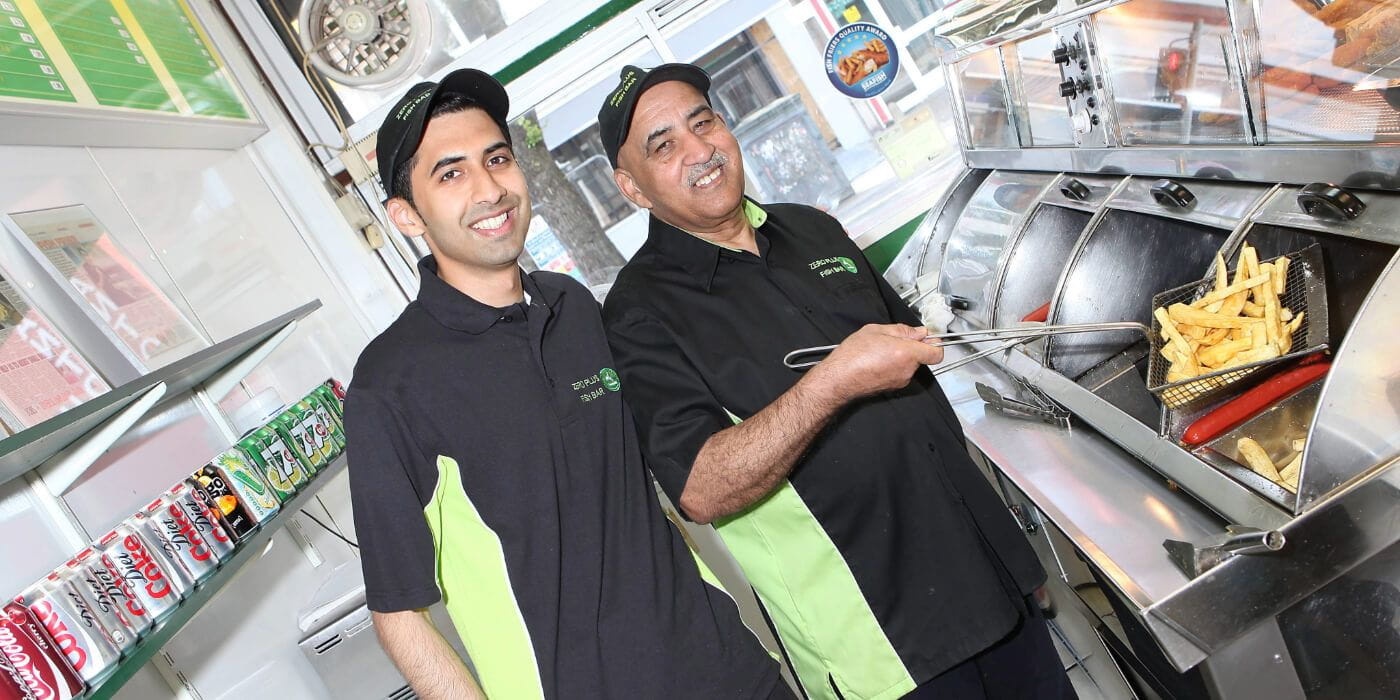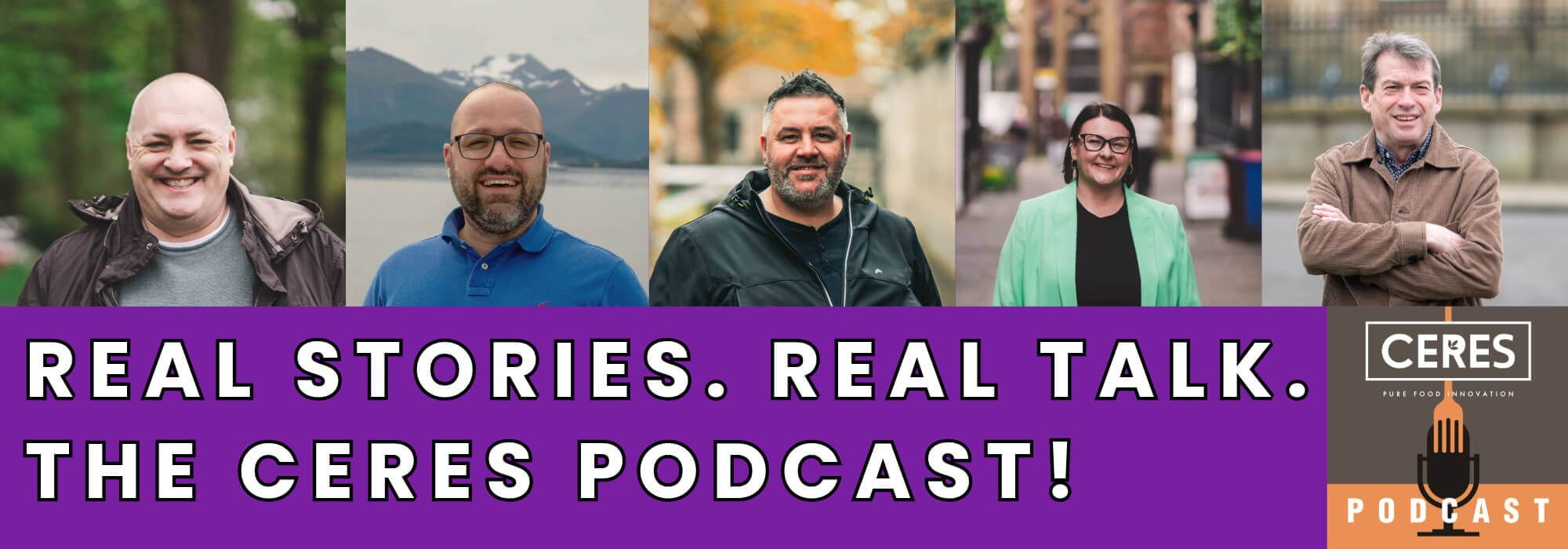Battered, Proud, and Welsh: Why Diversity Fuels Our Fish & Chip Trade
Posted by Zohaib Hussain on 7th May 2025 Reading Time:
Welcome to this edition of Trade Talks, where we bring you insights straight from the friers of the fish and chip industry. In this column, Zohaib Hussain, owner of Zero Plus Fish & Chips in Cardiff, shares his perspective on the trade.
I was born in Huddersfield, but make no mistake — I’m a Cardiffian through and through. My heart, my humour, and my heritage all trace back to Cardiff. That’s where my family built their future and where I learned what it means to serve a community — not just with food but with care, grit, and consistency.

Our family story began with my dad, Haji. He came to the UK from Pakistan in the 1960s — young, driven, and determined to build a life from scratch. Like many immigrants of his time, he started in a textile factory. It wasn’t glamorous, but it was honest work — a foot in the door of a country that promised opportunity if you were willing to work for it.
In 1991, Haji bought Zero Plus Fish Bar in Cardiff. And from that moment, the fryer never really went cold again.
Rooted in Cardiff
Despite being born up north, I’ve always felt more Welsh than anything else. Cardiff shaped me. It gave me a sense of identity, belonging, and purpose. The community there embraced us — not instantly, not without its doubts — but over time, through hard work and consistency, we became a familiar part of the local landscape.
I grew up in the shop. That wasn’t just a business; it was my childhood, my classroom, my training ground. I still remember standing in the doorway, staring at the queue of customers, then dragging an empty chip bucket to the prep room, bracing myself to lift it back full — using every ounce of strength my little arms had. On school holidays, I’d sit quietly on the stacked cans of Coke behind the counter, watching my parents serve customers with warmth and patience. Those moments taught me more about hard work, service, and resilience than any classroom ever could. That was my life — and weirdly, I loved it.
I saw my parents give everything — their time, their health, their energy — to build something lasting. They worked seven days a week, through holidays, illnesses, and all the quiet sacrifices that never make the headlines.

Stereotypes & Success
There were customers who questioned my parents’ presence behind the counter or assumed the food would somehow be different — not what they expected from a “proper” British chippy. But like so many others in our position, they responded not with defensiveness but with hard work, consistency, and quiet pride in their craft.
But they didn’t flinch. They just got on with it — day after day, night after night. That’s the part of the story that often gets missed. Across the UK, especially in urban and suburban areas, fish and chip shops have been quietly sustained by families like mine. Yet, our presence is rarely part of the “official” story of the industry.
Interestingly, in sectors like IT, healthcare or medicine, you’ll often find over-representation from ethnic minority communities — so why not in fish and chips? Why not at national awards or leadership tables? What’s holding people back here?

Breaking Barriers — and Wondering Where Everyone Else Is
In 2012, I won the Drywite Young Fish Frier of the Year award. It was the first time someone from a minority background had ever won a national title like that. I’ll never forget how that felt — like I’d cracked open a door that had been shut for far too long.
I genuinely hoped it would encourage others to walk through it.
But more than a decade later, I’m still asking: where is everyone else?
Why aren’t more minority owners entering awards?
I want to encourage anyone reading this — if you’re from a minority background- to get involved. Go to the meetings. Enter the awards. Speak up. You belong here just as much as anyone else. Don’t wait for permission.

Still Fighting Old Battles
Even now, in 2025, I asked a national distributor sales advisor about halal products and got the response, “What’s halal?”
I don’t even get angry anymore — I get tired. How can we still be this far behind in understanding basic customer needs?
If your salespeople don’t know the communities they serve, what hope is there for genuine growth? It’s not about ticking a diversity box. It’s about being connected to reality and prepared for the Britain we live in.
We need better education, better training, and more curiosity. This stuff shouldn’t be revolutionary. It should be standard.
A Wider Reflection
Recently, I read an article by Aman Dhesi on the Ceres blog — Fish, Chips & Me: Reclaiming a Story of Britain. His words struck me deeply. So many of his experiences mirrored mine. The feeling of being part of something proudly British while still being seen as “other.” The tightrope walk between tradition and change—that inner drive to contribute without losing yourself in the process.
Our stories — and Aman’s — and mine, aren’t unique. It’s echoed in takeaways, corner shops, and family businesses across Britain. It’s the rhythm of immigration: one generation lays the foundation, and the next decides whether to build or move on.
Why Inclusion Still Matters
Diverse backgrounds bring more to the table than just language or food preferences. They bring insight, empathy, problem-solving, and deep local roots. Minority shop owners often have stronger community ties than the multinationals trying to muscle in with apps and algorithms.
If the industry wants to survive — really survive — it needs to reflect the country it serves. That means broader representation in awards, leadership, supply chains, and beyond. Not tokenism, but real inclusion that values contribution over colour.

The Shared Table
Fish and chips aren’t just British — they’re ours. They belong to every family who has stood behind the fryer, taken pride in their craft, and kept the tradition alive. The hands may differ in Welsh, English, Pakistani, Caribbean, Kurdish, and Polish, but the heart is the same.
My dad, Haji, didn’t just fry fish. He built something from nothing. And in that fryer, I found identity, resilience, and a reason to keep showing up. For him. For us. For what’s still possible.
Let’s not leave these stories untold. Let’s pass them on.
Did you enjoy this Trade Talks column? Have industry insights or thoughts to share? We’d love to hear from you! Drop us a line at info@worldofceres.com.

